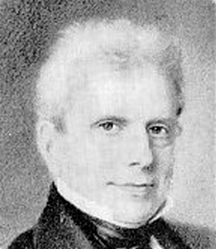Georgios Sinas
| Georgios Sinas | |
|---|---|

Contemporary portrait
|
|
| Native name | Γεώργιος Σίνας |
| Born |
November 20, 1783 Moschopolis, Ottoman Empire |
| Died | May 18, 1856 (aged 72) Vienna, Austrian Empire |
| Nationality | Greece |
| Occupation | Businessman |
| Known for | Banking and benefaction |
Georgios Sinas (Greek: Γεώργιος Σίνας, German: Georg Sina, 20 November 1783 - 18 May 1856) was a Greek entrepreneur, banker and national benefactor father of the national benefactor Simon Sinas. He was the founder of the Athens National Observatory.
Georgios Sinas was born in Moschopolis of Greek Aromanian origin, to Northern Epirotian parents. At an early age Sinas lost his mother and was raised by his aunt in Serres (modern Greece), where he lived his first school years. About 1790 he moved with his father, the tobacco and cotton merchant Georgios Sinas the Elder (1753–1822), to the Habsburg residence Vienna, where he finished his ground level studies. At the age of 20, he became involved with his father's businesses and managed to take initiatives and successfully expanded the family business.
He became chief director of the National bank of Austria, a position that he retained for 25 years. Moreover, he became a successful banker and subsidized not only enterprises but states and royal families in Europe. Already in 1818, he and his father were raised to Hungarian nobility by Emperor Francis I of Austria. He has contributed financially in the construction of the Chain Bridge (Budapest), the first permanent connection across the Danube between Buda and Pest, which is used even today. His name is inscribed on the base of the south western foundation of the bridge on the Buda side.
Georgios Sinas retained relations with the newly established Kingdom of Greece and in 1833 was made the ambassador of Greece to Austria by King Otto, a position he held for the rest of his life. He financially supported the Greek community in Vienna and his family's hometown of Moscopole (in Northern Epirus in southern region of Albania). Moreover, he donated huge amounts of money to philanthropic, cultural and educational institutions of the Greek state, like:
...
Wikipedia
